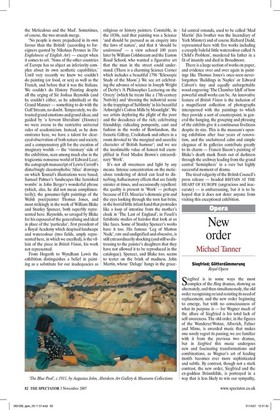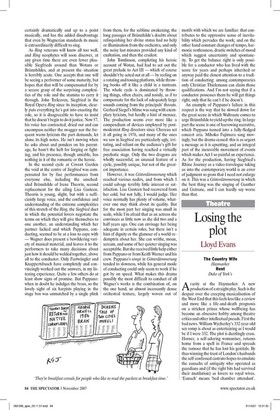New order
Michael Tanner Siegfried; Gotterammerung Royal Opera Siegfried is in some ways the most complex of the Ring dramas, showing us alternately, and then simultaneously, the old order recognising or/and resisting its need of replacement, and the new order beginning to emerge, but with no consciousness of what its purpose is — for Wagner much of the allure of Siegfried is his total lack of self-awareness. The old order, in the figures of the Wanderer/Wotan, Alberich, Fafner and Mime, is awarded music that makes one sorely regret its passing; we are familiar with it from the previous two dramas, but in Siegfried this music undergoes new and fascinating transformations and combinations, as Wagner's art of leading motifs becomes ever more sophisticated and subtle. By contrast, though not a stark contrast, the new order, Siegfried and the ex-goddess Brannhilde, is portrayed in a way that is less likely to win our sympathy, certainly dramatically and up to a point musically, and has the added disadvantage that even by Wagnerian standards its music is extraordinarily difficult to sing.
As Ring veterans will know all too well, and Ring neophytes will soon discover, at any given time there are even fewer plausible Siegfrieds around than Wotans or Brannhildes, and at present the situation is horribly acute. One accepts that one will be seeing a performer of some maturity, but hopes that that will be compensated for by a secure grasp of the surprising complexities of the role and the stamina to carry it through. John Treleaven, Siegfried in the Royal Opera Ring since its inception, clearly puts everything he's got into enacting the role, so it is disagreeable to have to insist that he doesn't begin to do it justice. Now 57, his voice has contracted, dried out and can encompass neither the swagger nor the frequent warm lyricism the part demands, let alone its high notes. He isn't moving when he asks about and ponders on his parentage, he hasn't the heft for forging or fighting, and his presence, though amiable, has nothing in it of the romantic or the heroic.
In the second cycle at Covent Garden the void at the centre of Siegfried was compensated for by fine performances from everyone else, including the unscheduled Brannhilde of Irene Theorin, second replacement for the ailing Lisa Gasteen. Theorin is young, slight, but with a sufficiently large voice, and the confidence and understanding of the extreme complexities of this stretch of the Ring, the Siegfried duet in which the potential lovers negotiate the terms on which they will give themselves to one another, an understanding which her partner lacked and which Pappano, conducting, seemed to be at a loss to cope with — Wagner does present a bewildering variety of musical material, and leaves it to the performers to take many decisions about just how it should be welded together, above all to the conductor. Only Furtwangler and Knappertsbusch have completely and convincingly worked out the answers, in my listening experience. Quite a few others do at least show signs of promise. But Pappano: when in doubt he indulges the brass, so the lovely sight of six harpists playing in the stage box was unmatched by a single plink from them, for the sublime awakening; the long passages of Brannhilde's doubts about relinquishing her divine status had no help or illumination from the orchestra, and only the noisy last minutes provided any kind of exaltation, and then the crudest.
John Tomlinson, completing his heroic account of Wotan, had had to act out the great prelude to Act III — which of course shouldn't be acted out at all — by reeling on a rotating and tossing platform, while throwing books off it like a child in a tantrum. The whole cycle is dominated by throwing things, often chairs, and noisily, as if to compensate for the lack of adequately large sounds coming from the principals' throats. Gerhard Siegel's Mime was sung with exemplary lyricism, but hardly a hint of menace. The production seems ever more like a compendium of devices employed by postmodernist Ring directors since Chereau set it all going in 1976, and many of the ones we saw in Siegfried are particularly ugly, irritating, and reliant on the audience's gift for free association having reached a virtually psychotic stage. Only the two dragons are wholly successful, an unusual feature of a cycle, possibly unique, but not of the greatest importance.
However, it was Gotterdammerung which reached various nadirs, and from which I could salvage terribly little interest or satisfaction. Lisa Gasteen had recovered from her cold, but not fully, I would judge. Her voice normally has plenty of volume, whatever one may think about its quality. But for the most part her singing was small in scale, while I'm afraid that as an actress she convinces as little now as she did two and a half years ago. One can envisage her being adequate in certain roles, but there isn't a hint of dignity or the glamour of a world-redemptrix about her. She can writhe, moan, scream, and some of her quieter singing was acceptable. But she received little help either from Pappano or from Keith Warner and his crew. Pappano's tempi in Gotterdammerung tended to slowness, while his general mode of conducting could only seem to work if he got by on speed. What makes this drama possibly the most difficult to conduct of all Wagner's works is the combination of, on the one hand, an almost incessantly dense orchestral texture, largely woven out of motifs with which we are familiar: that contributes to the oppressive sense of inevitability which pervades the work; and on the other hand constant changes of tempo, harmonic restlessness, drastic switches of mood which suggest uncertainty and spontaneity. To get the balance right is only possible for a conductor who has lived with the score for years and perhaps inherited or anyway paid the closest attention to a tradition of conducting: among contemporaries only Christian Thielemann can claim those qualifications. And I'm not saying that if a conductor possesses them he will get things right, only that he can't if he doesn't.
An example of Pappano's failure in this respect is the way that he slowed down for the great scene in which Waltraute comes to urge Brannhilde to yield up the ring. In large part the scene is one of harrowing narrative, which Pappano turned into a fully-fledged concert aria. Mihoko Fujimura sang movingly, but the drama ceased: this is as urgent a message as it is upsetting, and an integral part of the inexorable movement of events which makes Act I so painful an experience. As for the production, having Siegfried's Rhine Journey as a video travelogue taking us into the contemporary world is an error of judgment so gross that I need not enlarge on it. This was a Gotterdammerung in which the best thing was the singing of Gunther and Gutrune, and I can hardly say worse than that.













































































 Previous page
Previous page